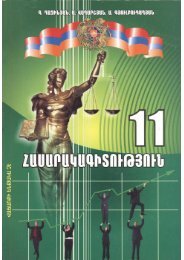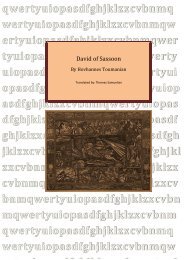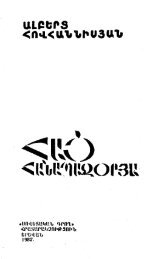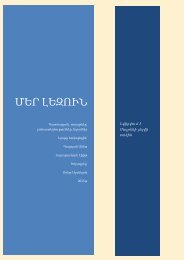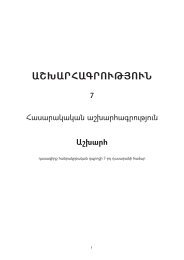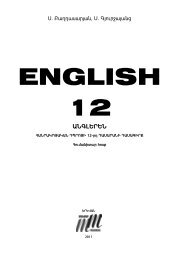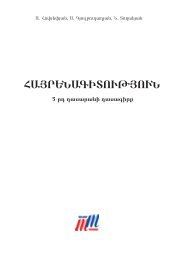- Page 1 and 2:
:
- Page 5 and 6:
; HISTORY OF ARMENIA BY FATHER ^I T
- Page 7 and 8:
INTRODUCTION / 1^ C3,^E: This valua
- Page 9 and 10:
CONTENTS OF THE FIRST VOLUME. Tigt
- Page 11 and 12:
CONTENTS. PART III. THE GOVERNMENT
- Page 13 and 14:
CONTENTS. Vll CHAPTER XVI. The reig
- Page 15 and 16:
CONTENTS. IX CHAPTER IV. The prefec
- Page 17 and 18:
CONTENTS. XI CHAPTER XVIII. The 'pe
- Page 19 and 20:
TO THE PRESIDENT AND MEMBERS OF THE
- Page 21:
DEDICATIOX. XT a Foreigner, wJioie
- Page 24 and 25:
XVlll PREFACE. hundred years ago by
- Page 26 and 27:
XX I'REFACE. task of translating th
- Page 28 and 29:
XXU PKfc-FACE. part of the History
- Page 30 and 31:
Xxiv PREFACE. a mistake in the name
- Page 32 and 33:
AX VI PREFACE. nople in the year 17
- Page 34 and 35:
XXVlll PREFACE. undertuken by these
- Page 36 and 37:
XXX PREFACE. mencing with St. Grego
- Page 38 and 39:
XXXll PREFACE. Gregory Vikayaser th
- Page 40 and 41:
; XXxiv PREFACE. various times. Tli
- Page 42 and 43:
XXXvi PREFACE. In the beginning of
- Page 44 and 45:
XXXviii PREFACE. soon chansred the
- Page 46 and 47:
the Greeks, by the irruptions of th
- Page 49 and 50:
THE ORIGIN OF THE ARMENIANS. XXFTER
- Page 51 and 52:
THE ORIGIN OF THE ARMENIANS. was th
- Page 53 and 54:
; FOUNDATION OF ARMENIA. 6 events w
- Page 55 and 56:
POUNDATIOX or ARMENIA. f submitted
- Page 57 and 58:
FOUNDATION OF ARMENIA. 9 tors, Cadm
- Page 59 and 60:
; REIGNS OF ARMENAC AND HARMA. 11 p
- Page 61 and 62:
REIGNS OF ARMENAC AND HARMA. 13 ban
- Page 63 and 64:
REIGNS OF ARM^EKAC AND HARMA. 15 of
- Page 65 and 66:
17 CHAPTER III. Reign of Aram to th
- Page 67 and 68:
subjects. HISTOEY OF ARMENIA. 10 Th
- Page 69 and 70:
; HISTORY OF ARMENIA. then consider
- Page 71 and 72:
HISTORY or ARMENIA. 23 the life of
- Page 73 and 74:
HISTORY OF ARMENIA. 25 30th ; eight
- Page 75 and 76:
HISTORY OF ARMENIA. 27 63 years. He
- Page 77 and 78:
HISTORY OP ARMENIA. 29 The successo
- Page 79 and 80:
HISTORY OF ARMENIA. 31 rious prince
- Page 81 and 82:
BISTORT or ARMENIA. 9» signs of ro
- Page 83 and 84:
HISTORY OF ARMENIA. 35 his crown by
- Page 85 and 86:
HISTORY OF ARMENIA. 37 which the po
- Page 87 and 88:
HISTORY OF ARMENIA. 39 nezzar; but
- Page 89 and 90:
HISTORY OF ARMENIA. ^^ the hand of
- Page 91 and 92:
HISTORY OF ARMENIA^ 43 » CHAPTER V
- Page 93 and 94:
HISTORY OF ARMENIA. 45 king of the
- Page 95 and 96:
HISTORY OF ARMENIA. 47 siding over
- Page 97 and 98:
HISTORY OF ARMENIA . ^ tyrannical c
- Page 99 and 100:
HISTORY or ARMENIA, 51 CHAPTER II.
- Page 101 and 102:
; HISTORY OF ARMENIA. 63 Hannibal f
- Page 103 and 104:
take possession of it. HISTORY OF A
- Page 105 and 106:
HISTORY OF ARMENIA. 57 This Arsaces
- Page 107 and 108:
HISTORY OF ARMENIA 59 Chaldeans, La
- Page 109 and 110:
HISTORY OF ARMENIA. ^* expressed pl
- Page 111 and 112:
kept at HISTORY OF ARMENIA. 63 a di
- Page 113 and 114:
HISTORY Ol" ARMENIA, 65 not consent
- Page 115 and 116:
; HISTORY OF ARMENIA. 67 their numb
- Page 117 and 118:
HISTORY OF ARMENIA. 69 upon his las
- Page 119 and 120:
HISTORY OF ARMENIA. 71 doms of Mith
- Page 121 and 122:
HISTORY OF ARMENIA. 73 he would del
- Page 123 and 124:
HISTORY OF ARMENIA, 75 to lay siege
- Page 125 and 126:
HISTORY OF ARMENIA. '* lected that
- Page 127 and 128:
HISTORY OF ARMENIA. 79 vanced towar
- Page 129 and 130:
HIBTORT OF AlkM£KXA. M WDimds tbey
- Page 131 and 132:
HISTORY or ARMENIA. 83 drink, and a
- Page 133 and 134:
HISTORY OF ARMENIA. 85 Romans, the
- Page 135 and 136:
HISTORY OF ARMENIA. 87 his son bein
- Page 137 and 138:
sisting thelatter. HISTORY OF ARMEN
- Page 139 and 140:
HISTORY OF ARMENIA. 91 having colle
- Page 141 and 142:
HISTORY OF ARMENIA. 93 ; C H A P T
- Page 143 and 144:
HISTORY OF ARMENIA. 95 quently went
- Page 145 and 146:
HISTORY or ARMENIA. 97 subsequent h
- Page 147 and 148:
HISTORY OF ARMENIA. 90 then residin
- Page 149 and 150:
» iiation. HISTORY OF ARMENIA. 1^*
- Page 151 and 152:
HISTORY OF ARMENIA. 103 court from
- Page 153 and 154:
HISTORY OF ARMENIA. 105 the Roman g
- Page 155 and 156:
HISTORY OF ARMENIA. 1^' the seventy
- Page 157 and 158:
HISTORY OF ARMENIA. 109 bishop died
- Page 159 and 160:
HISTOKY OF ARMENIA 111 followers of
- Page 161 and 162:
« HISTORY OF ARMENIA. 113 more mag
- Page 163 and 164:
HISTORY OF ARMENIA. 115 Artaces, ki
- Page 165 and 166:
HISTORY OF ARMENIA. H' them. Hirami
- Page 167 and 168:
HISTORY OF ARMENIA. 119 pitiless cr
- Page 169 and 170:
HISTORY OF ARMENIA. 121 Darius, irr
- Page 171 and 172:
HISTORY OPARMENIA» 12$ other, by r
- Page 173 and 174:
HISTORY OF ARMENIA. ^^^ amidst the
- Page 175 and 176:
HISTORY OF ARMENIA. 127 the blood o
- Page 177 and 178:
HISTORY OF ARMENIA. 129 Erwaz chief
- Page 179 and 180:
HISTORY OF ARMENIA. 131 a revolt al
- Page 181 and 182:
HISTORY OF ARMENIA. 133 partial suc
- Page 183 and 184:
HISTORY OF ARMENIA. 135 covered by
- Page 185 and 186:
; HISTOKY OF ARMENIA. 137 to presen
- Page 187 and 188:
the youth my brother. HrSTORY OF AR
- Page 189 and 190:
HISTORY OF ARMENIA. 141 lousy of hi
- Page 191 and 192:
HISTORY OF ARMENIA. 143 devastation
- Page 193 and 194:
HISTORY OF ARMENIA. 145 surrounded
- Page 195 and 196:
HISTORY OF ARMENIA. 147 ^^' they we
- Page 197 and 198:
quest." HISTORY OF ARMENIA. 149 Ple
- Page 199 and 200:
HISTORr OF ARMENtA. 151 on her reac
- Page 201 and 202:
HISTORY OF ARMENIA. ^^3 of one from
- Page 203 and 204: HrSTORY or ARMENIA. 155 the Hagarit
- Page 205 and 206: HISTORY OF ARMENIA. 157 entered a m
- Page 207 and 208: HISTORY OF ARMENIA. 159 C II AFTER
- Page 209 and 210: in HISTORY OF ARMENIA* 161 battle S
- Page 211 and 212: HISTORY OF ARMENIA. 163 return, Tir
- Page 213 and 214: lameable. HISTORY OF AKMENIA. -165
- Page 215 and 216: HISTORY OF ARMENIA. 167 in that eve
- Page 217 and 218: HISTORY OF ARMENIA. 169- Khosrove s
- Page 219 and 220: HISTORY OF AHMEKIA. soldiers and no
- Page 221 and 222: HISTORY OF ARMENIA. 173 time after,
- Page 223 and 224: ; HISTORY OF ARMENIA. 175 Armenia f
- Page 225 and 226: HISTORY OF ARMENIA. 177 he should,
- Page 227 and 228: HISTORY OF ARMENIA. 179 determined
- Page 229 and 230: HISTORY OF ARMENIA. 181 CHAPTER XVI
- Page 231 and 232: HISTORY OF ARMENIA. 183 immediate s
- Page 233 and 234: HISTORY OF ARMENIA. 185 family of t
- Page 235 and 236: HISTORY OF ARMENIA. 187 king", givi
- Page 237 and 238: HISTORY OF ARMENIA. 189 the decease
- Page 239 and 240: HISTORY OF ARMENIA. 191 Being arriv
- Page 241 and 242: HISTORY OF ARMENIA. iS3 called asse
- Page 243 and 244: HISTORY OF ARMENIA. 195 the inhabit
- Page 245 and 246: HISTORY OF ARMENIA. which he had se
- Page 247 and 248: : HISTORY OF ARMENIA. *9^ sufficien
- Page 249 and 250: HISTORY OF ARMENIA. 201 ivas a man
- Page 251 and 252: HISTORY OF ARMENM. 203 fete of his
- Page 253: HISTORY OF ARMENIA. 205 The Armenia
- Page 257 and 258: his kingdom. mSTORY OF ARMENIA. 20(
- Page 259 and 260: HKTORY OF ARMENIA. 21i take possess
- Page 261 and 262: HISTORY OF ARMENIA. 213 'Was then i
- Page 263 and 264: of their opponents. nrSTORT OF ARME
- Page 265 and 266: HISTORY OF ARMENIA* 217 that body o
- Page 267 and 268: HISTORY OF ARMENIA. 219 with the bi
- Page 269 and 270: HISTORY OF ARMENIA. 221 Pap, after
- Page 271 and 272: HISTORY OF ARMENIA. 223 was but a y
- Page 273 and 274: HISTORY OF ARMENIA. 225 alliance we
- Page 275 and 276: the eastern nations. HISTORY OF ARM
- Page 277 and 278: HISTORY OF ARMENIA. 229 gence of th
- Page 279 and 280: ; HISTORY OF ARMENIA. 231 surrounde
- Page 281 and 282: HISTORV OF ARMENIA. 233 estimable q
- Page 283 and 284: nature of the attack. HiSTORY OF AR
- Page 285 and 286: HISTORY OF ARMENIA. 237 wliieh had
- Page 287 and 288: HISTORY OF ARMENIA. 239 nation. St.
- Page 289 and 290: HISTORY OF ARMENIA. 241 the oT^ject
- Page 291 and 292: HISTORY OF ARMEXIA. 243 stones, tha
- Page 293 and 294: HISTORY OF ARMENIA. 245 the power o
- Page 295 and 296: HISTORY OF ARMENIA, 247 meeting in
- Page 297 and 298: HISTORY OF ARMENIA. 249 first went
- Page 299 and 300: HISTORY OF ARMENIA. 25! ^urmak to s
- Page 301 and 302: HISTORT OF ARMENIA. 253 countries a
- Page 303 and 304: HISTORY OF ARMENIA. ^^^ he bitterly
- Page 305 and 306:
ftlSTORY OF ARMINlA. 257 some menti
- Page 307 and 308:
HISTORY OF ARMENIA. 259 which Vasak
- Page 309 and 310:
HISTORY OF ARMENIA. 261 Vasak the p
- Page 311 and 312:
HISTORY OF ARMENIA. 263 Armenian no
- Page 313 and 314:
HT:ST0RY of ARMENIA. 205 stood. The
- Page 315 and 316:
HISTORY OF ARMENIA. 2
- Page 317 and 318:
HISTORY or ARMENIA. 269 Vardan and
- Page 319 and 320:
HISTORY OF ARMENIA. 271 should be p
- Page 321 and 322:
HKTORT OF ARMENIA. 273 The Armenian
- Page 323 and 324:
HISTORY OF ARMENIA. ^75 affairs, an
- Page 325 and 326:
HISTORY OF ARMENIA. 277 mg the chur
- Page 327 and 328:
; HISTORY OF ABMENIA. 279 there. On
- Page 329 and 330:
; HISTORY OF ARMENIA. 281 other in
- Page 331 and 332:
HISTORY OF ARMENIA. 283 the king or
- Page 333 and 334:
HI8T0RT OF ARMENIA. 285 Others, and
- Page 335 and 336:
HISTORY OF ARMENIA. 287 He at lengt
- Page 337 and 338:
HISTORY OF ARMENIA. 2S9 power of Go
- Page 339 and 340:
HISTORY OF ARMENIA. 291 army, the c
- Page 341 and 342:
HISTORY OF ARMENIA. 2ids td his fri
- Page 343 and 344:
HISTORY OF ARMENIA. 295 loss of onl
- Page 345 and 346:
HISTORY OF ARMENIA. 297 Johan, prin
- Page 347 and 348:
HISTORY OF ARMENIA. 299 These arran
- Page 349 and 350:
HISTORY OF ARMENIA. 301 escaped fro
- Page 351 and 352:
HISTORY OF ARMENIA. 303 rendering t
- Page 353 and 354:
HISTORY OF ARMENIA. 305 chains, and
- Page 355 and 356:
HISTORY OF ARMENIA. 307 he was enga
- Page 357 and 358:
HISTORY OF ARMENIA. 309 the mountai
- Page 359 and 360:
HISTORY OF ARMENIA. 311 of Nerseh a
- Page 361 and 362:
HISTORY OF ARMENIA. 313 with them b
- Page 363 and 364:
HISTORY Of ARiTENIA. 3lfi These, ha
- Page 365 and 366:
; HISTORY OF ARMENIA, 317 CHAPTER X
- Page 367 and 368:
HISTORY OF ARMENIA. 319 prefect the
- Page 369 and 370:
1 HISTORY OF ARMENIA. ^1 and receiv
- Page 371 and 372:
HISTORY OF ARMENIA. lh« same cours
- Page 373 and 374:
HISTORY or ARMENIA. 325 to render h
- Page 375 and 376:
HISTORY or ARMENIA. 327 worship of
- Page 377 and 378:
HISTORY OF ARMENIA. 329 ery short d
- Page 379 and 380:
HISTORY OP ARMENIA. 331 took place
- Page 381 and 382:
HISTORY OF ARMENIA. 333 teen years.
- Page 383 and 384:
HISTORY OF ARMENIA. 335 nation with
- Page 385 and 386:
HISTORY OF ARMENIA. 337 their situa
- Page 387 and 388:
HrSTORY OF ARMENIA. 339 ^ople, befo
- Page 389 and 390:
HISTORY OF ARMENIA. 341 Vahram his
- Page 391 and 392:
HISTORY OF ARMENIA. 343 tion to the
- Page 393 and 394:
HISTORY OF ARMENIA-. 345 public, Ab
- Page 395 and 396:
HISTORY OF ARMENIA. 347 having in i
- Page 397 and 398:
HISTORY OF ARMENIA. 349 of his serv
- Page 399 and 400:
HISTORY OF ARMENIA. S61 Ihe false s
- Page 401 and 402:
HISTORY OF ARMENIA. 353 After this,
- Page 403 and 404:
HISTORY OF ARMENIA. 355 Armenia. Be
- Page 405 and 406:
HISTORY OF ARMENIA. 357 was deprive
- Page 407 and 408:
HISTORY OF ARMENIA. 359 this event
- Page 409 and 410:
HISTORY OF ARMENIA. 361 desolated D
- Page 411 and 412:
HISTOHV of ARMENtA. ^3 heen thrown
- Page 413 and 414:
HISTORY OF ARMENIA. 365 imploring h
- Page 415 and 416:
HISTORY OF ARMENIA. 367 chief of on
- Page 417 and 418:
HISTORY OF ARMENIA* 569 diately aft
- Page 419 and 420:
HISTORY OF ARMENIA. 371 the separat
- Page 421 and 422:
HISTORY OF ARMENIA. 373 Nerseh Shir
- Page 423 and 424:
HISTORY OF ARMENIA. 375 immediately
- Page 425 and 426:
HISTORY OF ARMEWtA* 377 Before he e
- Page 427 and 428:
HISTORY OF ARMENIA. 379 the propert
- Page 429 and 430:
HISTORY or ARMENIA. *^°* course sa
- Page 431 and 432:
HISTORY OP ARMENIA. 383 CHAPTER XX.
- Page 433 and 434:
HISTORY OF ARMENIA. 385 trenches an
- Page 435 and 436:
HISTORY OF ARMENIA. 387 he was reca
- Page 437 and 438:
HISTORY OF ARMENIA. 3^9 died. His s
- Page 439 and 440:
HISTORY OF AiniENIA. 391 Inspirited
- Page 441 and 442:
HISTORY OF ARMENIA. 39^3 were at le
- Page 443 and 444:
"HISTORY OF ARMENIA. 395 ceeded by
- Page 445 and 446:
HTSTORY OF ARMENIA. 397 upon the vi
- Page 447 and 448:
follow rebellions, HISTORY OF ARMEN
- Page 449 and 450:
HISTORY OF ARMENIA. 401 After this
- Page 451 and 452:
HISTORY OF ARMENIA. 403 means to ov
- Page 453 and 454:
HISTORY or ARMENIA. 405 The (Toveri
- Page 455 and 456:
HISTORY OF ARMENIA. 407 manured the
- Page 457 and 458:
Saracens had to pass in HISTORY OF
- Page 459 and 460:
persons. HISTORY OF ARMENIA. 411 He
- Page 461 and 462:
HISTORY OF ARMENIA. 413 solating hi
- Page 465 and 466:
UC SOUTHERN REGIONAL LIBRARY FACILI




